Do You Believe in Magic (song)
"Do You Believe in Magic" is a song by American rock band the Lovin' Spoonful, written by John Sebastian in 1965. The single peaked at number 9 on the Billboard Hot 100 chart. In 1978, Shaun Cassidy reached the Top 40 with his cover version.
| "Do You Believe in Magic" | ||||
|---|---|---|---|---|
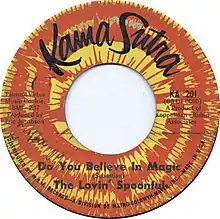 | ||||
| Single by the Lovin' Spoonful | ||||
| B-side | "On the Road Again" | |||
| Released | July 20, 1965[1] | |||
| Recorded | June 1965[2] | |||
| Studio | Bell Sound, New York City | |||
| Genre | Folk rock,[3] pop,[4] rock[5] | |||
| Length | 2:17 | |||
| Label | Kama Sutra | |||
| Songwriter(s) | John Sebastian | |||
| Producer(s) | Erik Jacobsen | |||
| The Lovin' Spoonful singles chronology | ||||
| ||||
| Audio | ||||
| "Do You Believe in Magic" on YouTube | ||||
The Lovin' Spoonful version
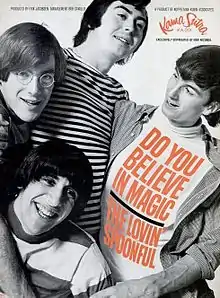
In 1965, The Lovin' Spoonful originally recorded and released the song as the first single from their debut studio album Do You Believe in Magic. The single was well received by the public and became a top ten hit on the Billboard Hot 100, peaking at number 9. According to the lyrics, the magic referenced in the title is the power of music to supply happiness and freedom to both those who make it and those who listen to it. The Lovin' Spoonful's version was ranked number 216 on Rolling Stone's list of The 500 Greatest Songs of All Time. Billboard said of the original single release that the "pulsating folk-flavored rhythm number serves as a strong and exciting debut for new group in the Byrds vein."[6] Cash Box described it as a "rollicking, teen-angled romancer with an infectious danceable riff."[7] Record World said that it has "plenty of beat and plenty of contemporary grit sound."[8]
In a 2007 DVD entitled The Lovin' Spoonful with John Sebastian - Do You Believe in Magic, author Sebastian illustrates how he sped up the three-chord intro from Martha and the Vandellas' "Heat Wave" to come up with the intro to "Do You Believe in Magic."
"Do You Believe in Magic" was featured in Magic in the Water, The Parent Trap, American Pie, Date Movie, Temple Grandin, and The Super Mario Bros. Super Show!. The original version was also the theme song for the short-lived TV series State of Grace. The song is also significantly featured in the Jim Sheridan movie In America, as an Irish-immigrant family, having entered the U.S. on false pretenses, enter New York City for the first time.
In 2002, "Do You Believe in Magic by The Lovin' Spoonful was inducted into the Grammy Hall of Fame.[9]
Charts
|
|
Shaun Cassidy version
| "Do You Believe in Magic" | ||||
|---|---|---|---|---|
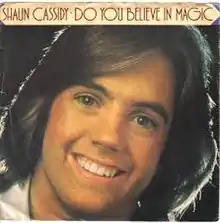 | ||||
| Single by Shaun Cassidy | ||||
| from the album Born Late | ||||
| B-side | "Teen Dream" | |||
| Released | March 1978 | |||
| Recorded | 1977 | |||
| Genre | Pop | |||
| Length | 2:15 | |||
| Label | Warner Bros. | |||
| Songwriter(s) | John Sebastian | |||
| Producer(s) | Michael Lloyd | |||
| Shaun Cassidy singles chronology | ||||
| ||||
"Do You Believe in Magic" became a top forty hit again in 1978 in both the U.S. and Canada when Shaun Cassidy released his cover as a single. Cassidy's version reached number 31 on the Billboard Hot 100. The song was Cassidy's second successful remake of a 1960s hit, the first being "Da Doo Ron Ron" from his previous LP.
Aly & AJ version
| "Do You Believe in Magic" | ||||
|---|---|---|---|---|
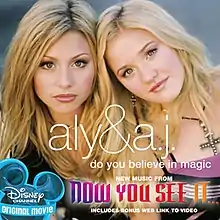 | ||||
| Single by Aly & AJ | ||||
| from the album Into the Rush | ||||
| Released | February 15, 2005 | |||
| Recorded | 2004 | |||
| Genre | ||||
| Length | 2:14 | |||
| Label | Hollywood | |||
| Songwriter(s) | John. B. Sebastian | |||
| Producer(s) | Matthew Gerrard | |||
| Aly & AJ singles chronology | ||||
| ||||
| Alternative cover | ||||
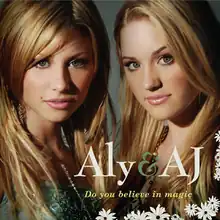 UK/digital cover | ||||
"Do You Believe in Magic" was covered by American pop rock duo Aly & AJ. Their version of the song was for Aly's film Now You See It..., and it also appeared in the 2007 Disney film "The Game Plan" as well as on their debut studio album, Into the Rush, in addition to an appearance on the 2009 soundtrack to the TV show Wizards of Waverly Place. The video has Aly and AJ performing with acoustic guitars in their loft apartment, cuddling their dog, taking Polaroids and then finger painting.
Release history
| Date | Country | Format | Label |
|---|---|---|---|
| February 15, 2005 | United States | CD | Hollywood Records |
| June 5, 2006 | Belgium | ||
| United Kingdom | Digital download | EMI |
Chart performance
| Chart (2005) | Peak position |
|---|---|
| US Hot Singles Sales (Billboard)[18] | 2 |
References
- Jackson, Andrew Grant (2015). 1965: The Most Revolutionary Year in Music. New York City: Macmillan Publishers. p. xvii. ISBN 978-1-4668-6497-9 – via the Internet Archive.
- Edmonds, Ben (2002). Do You Believe in Magic (Liner notes). The Lovin' Spoonful. Buddha Records, Kama Sutra Records. 74465 99730 2.
- Unterberger, Richie. "Great Moments in Folk Rock: Lists of Aunthor Favorites". www.richieunterberger.com. Retrieved 2011-01-26.
- Perone, James E. (2018). Listen to Pop! Exploring a Musical Genre. Santa Barbara, California: ABC-CLIO. p. 115. ISBN 978-1-4408-6377-6 – via Google Books.
- Unterberger, Richie. "Do You Believe in Magic? The Lovin' Spoonful". AllMusic. Archived from the original on 11 April 2023. Retrieved 10 April 2023.
- "Spotlight Singles" (PDF). Billboard. August 7, 1965. p. 16. Retrieved 2021-03-11.
- "CashBox Record Reviews" (PDF). Cash Box. August 7, 1965. p. 16. Retrieved 2022-01-12.
- "Singles Reviews" (PDF). Record World. August 7, 1965. p. 8. Retrieved 2023-07-19.
- "GRAMMY HALL OF FAME AWARD". www.grammy.com. Retrieved 2023-07-17.
- "RPM 100 (October 18, 1965)". Library and Archives Canada. 17 July 2013. Retrieved April 17, 2023.
- "The Lovin' Spoonful Chart History (Hot 100)". Billboard. Retrieved April 17, 2023.
- "Cash Box Top 100 – Week of October 16, 1965" (PDF). Cash Box. October 16, 1965. p. 4.
- "Record World 100 Top Pops – Week of October 16, 1965" (PDF). Record World. October 16, 1965. p. 15.
- "Top Singles of 1965" (PDF). Billboard. December 25, 1965. pp. 22–23 – via WorldRadioHistory.com.
- "Top 100 Chart Hits of 1965" (PDF). Cash Box. December 25, 1965. pp. 14–16 – via WorldRadioHistory.com.
- Joel Whitburn's Top Pop Singles 1955-2002
- Whitburn, Joel (1999). Pop Annual. Menomonee Falls, Wisconsin: Record Research Inc. ISBN 0-89820-142-X.
- "Hot Singles Sales : Apr 09, 2005". Billboard. Retrieved June 5, 2017.